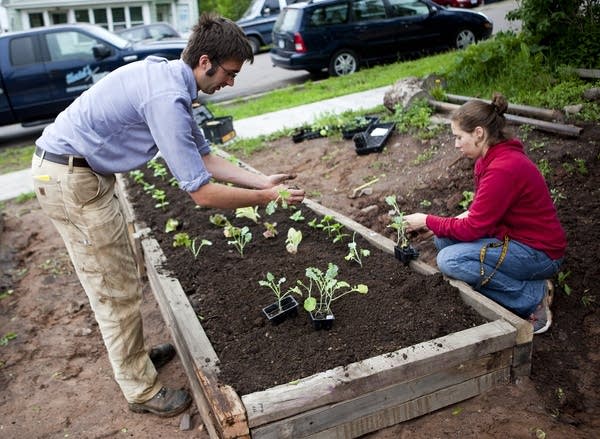Program gives jobs to teens, fresh produce to restaurants
Go Deeper.
Create an account or log in to save stories.
Like this?
Thanks for liking this story! We have added it to a list of your favorite stories.

On a vacant lot in a run-down Duluth neighborhood, two raised beds are set on a sloping expanse of sand. The beds are full of soft, rich-looking soil.
Organizers of the Seeds for Success program are showing an intern how to plant basil.
"You want to bury it somewhat below the level of the cotyledons," Michael Latsch tells the intern.
Latsch, an experienced farmer, is confident there will be eager restaurateurs ready to buy everything that's planted.
Turn Up Your Support
MPR News helps you turn down the noise and build shared understanding. Turn up your support for this public resource and keep trusted journalism accessible to all.
"Basil, I mean everybody uses basil," he said. "We've had lot of inquiries about mints for mixed drinks at different bars. The demand here in Duluth for locally produced stuff far outstrips the supply."
Here, and on a couple other vacant lots around town, there will soon be lush gardens full of cucumbers and carrots, beets and broccoli, even tomatoes.

But Seeds for Success is about more than helping restaurants entice customers with fresh, local food. It's also about creating jobs. As soon as the paperwork is done, half-a-dozen teenagers from low-income families will be tending these plots.
The project is also helping to improve the neighborhood by converting an empty lot from a garbage dump to a productive garden. More important, organizers say, is that it shows the neighbors anyone can eat healthy food.
"It's thought of as something for the wealthy, that low-income people can't afford fresh produce," coordinator Emily Kniskern said. "We want to show people that it's possible to grow your own, it's possible to be part of a local sustainable food system."
Across town, in the artsy end of downtown Duluth, Savannah Villa washes tomatoes trucked up from the south -- at least as far south as Iowa. Villa, a cook at the trendy new Zeitgeist Cafe, said its menu often features local foods.
"We have trout in right now that's really great, from Lake Superior," she said. "The whitefish is local, and that's great. Produce -- hopefully we'll be getting more of it once the season comes along a little farther."

That's one challenge for Duluth farmers: it takes so long for the weather to warm up enough to grow anything. But the Seeds for Success project aims to extend its growing season by building a greenhouse.
The project came out of a community-wide brainstorming session that's been going on for the last six months or so.
Tony Cuneo, co-executive director, of the Zeppa Family Foundation, a local foundation, brought groups and individuals together to talk about how to create a viable community, both now and in the future.
"How do we leave a community as beautiful and clean as the one we have for the next generation, and how do we do it in a way that creates jobs and recognizes the need for economic development?" Cuneo asked. "This is a discussion needs to happen across the whole community."
The Seeds for Success project is creating seven jobs. It's helping people learn how to produce healthy food, using less transportation fuel -- and encouraging people from all economic levels to eat better.

More than 100 volunteers came up with ideas in other fields -- protecting natural resources, producing energy, using buildings better.
They'll present their ideas to the community at a meeting and dinner Wednesday night. They hope that gathering will be another step toward a sustainable future for Duluth.



